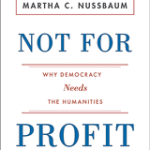
(German translation of this blog posting here on the Berliner Gazette site)
It is easy to agree with Martha Nussbaum’s latest manifesto essay Not For P rofit. Yes, democracy needs the humanities. There is too much emphasis in society on economic growth–and education is not counter-balancing this tendency enough. We need more music classes, theatre, literature, foreign languages (that is, in countries like the US, Japan etc.) in primary and secondary schools.
rofit. Yes, democracy needs the humanities. There is too much emphasis in society on economic growth–and education is not counter-balancing this tendency enough. We need more music classes, theatre, literature, foreign languages (that is, in countries like the US, Japan etc.) in primary and secondary schools.
But from a critical new media perspective I am not very charmed with the ‘liberal arts’ model. Time and again I have to make the experience that the holistic all-rounders with a broad and general background are our weakest students. How come? Why does a general upbringing makes kids so out of touch, in non-weird way? It would be great if the ‘liberal arts’ approach would be radical untimely and be despised as a breading ground for young dissents, wild talent, impossible personalities. Instead it is just irrelevant. The liberal arts approach claims that their students do not derail, drop out and become better people. This could be the case. But what they lack is a basic interest in what’s going in society. They lack passion for the politics and culture of our fucked-up techno-society. Many of them are indifferent, if not hostile, to programming and code. Respect. But what lacks here is a Project. Of course they do not want to become old-school activists. Liberal arts students cannot become ‘creative’ either because that’s too commercial. At best they are slightly counter-cultural for a while, but never in a direct confrontation with the Authorities. Martha Nussbaum is not discussing all this, of course. Not For Profit doesn’t ask any strategic question. It is no longer enough to argue for more arts and humanities, just for the sake of it, without a program, without a soul, without a warm link to the dirty networked techno spaces that we inhabit.
The multidisciplinary approach that is celebrated here is a lie, exactly because society is not multidisciplinary. The hard sciences are not criticized or attacked. Their dominant position in terms of funding (85%) is not questioned and its links to the corporate world not mentioned. Instead, what we hear is charming plea to give the humanities, bitte, bitte, some air play. This is done from a position of weakness, without wit or irony.
What Martha Nussbaum proposes is arts and humanities as a compensation for the ‘cultivation of the technical’. Instead of fighting for ‘liberal arts’ as antidote I would argue to bring out, to play out, the technological in the humanities, and stop seeing them as opposites. Painting is a technique, so is dancing. Writing is. These are basic insights of media theory that are apparently not shared by everyone.
We can no longer uncritically use arts and humanities in some sort of chess games that we play against economic interests. A lot of the arts and humanities as they are being taught these days are dusty remainders of a fading bourgeois middle class that is under threat from mass culture, consumerism and globalization. Its curriculum is deeply anti-technical in an unconscious way, that is, unpronounced and uninformed, as sentiment, not as a programmatic statement. Martha Nussbaum has managed to not mention television, computerization or the internet once. But what do the humanities have to say about these developments? A lot, of course. Our culture is a digital culture. We cannot leave that out of the equation, and only blame the low profit-driven motives. We can no longer call for the imagination. The imagination has gone technical. Thoughtful citizens express themselves in ones and zeros. But this banal observation has yet to be incorporated in the philosophy a la Nussbaum.


